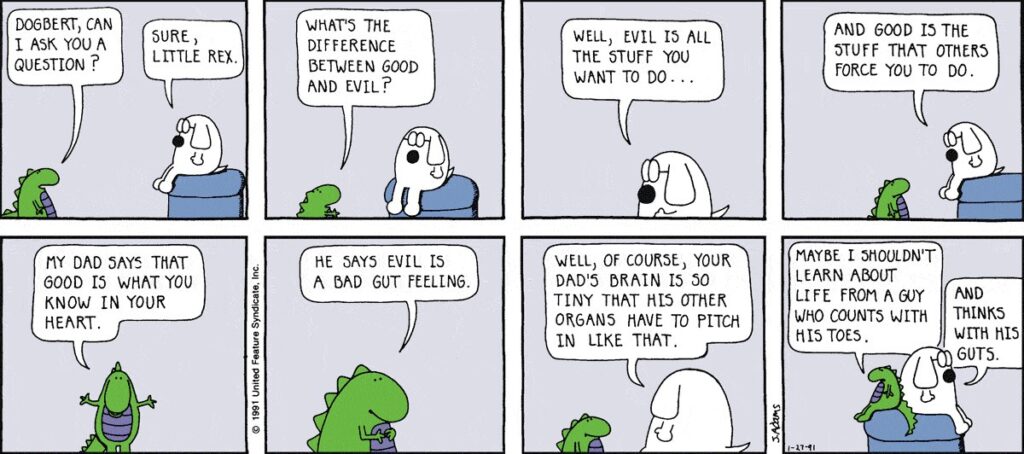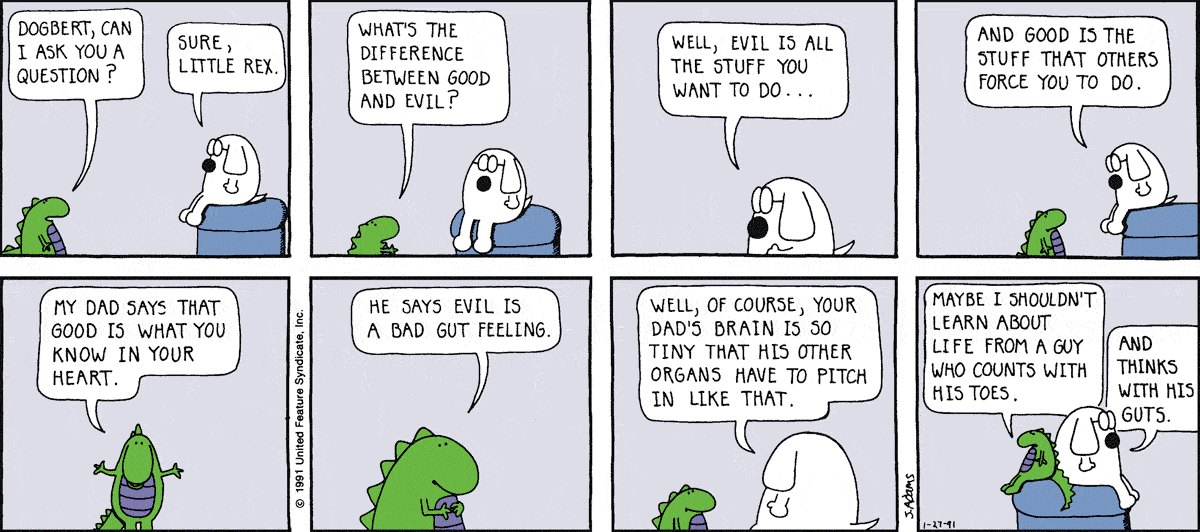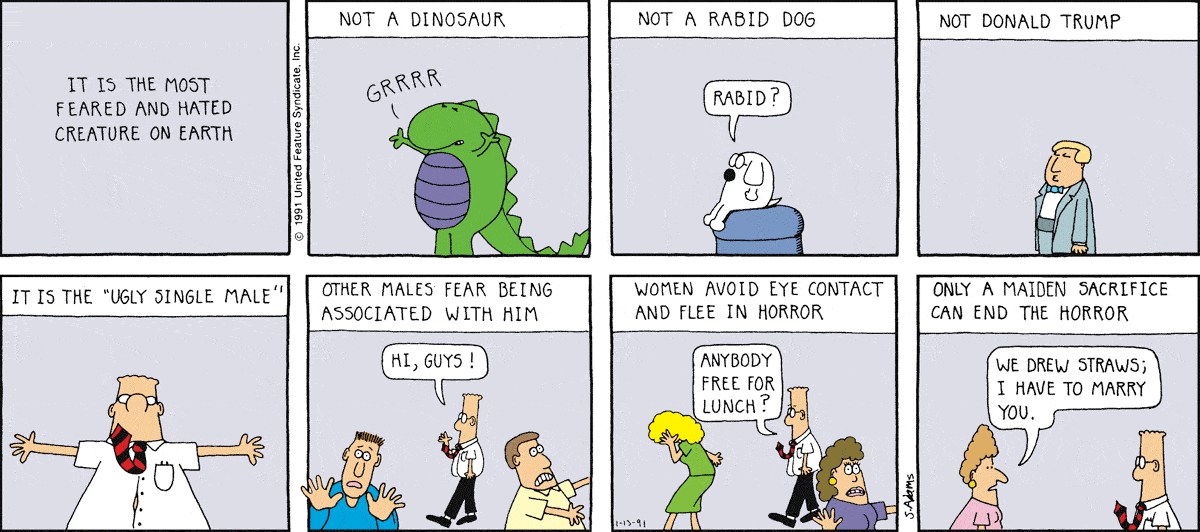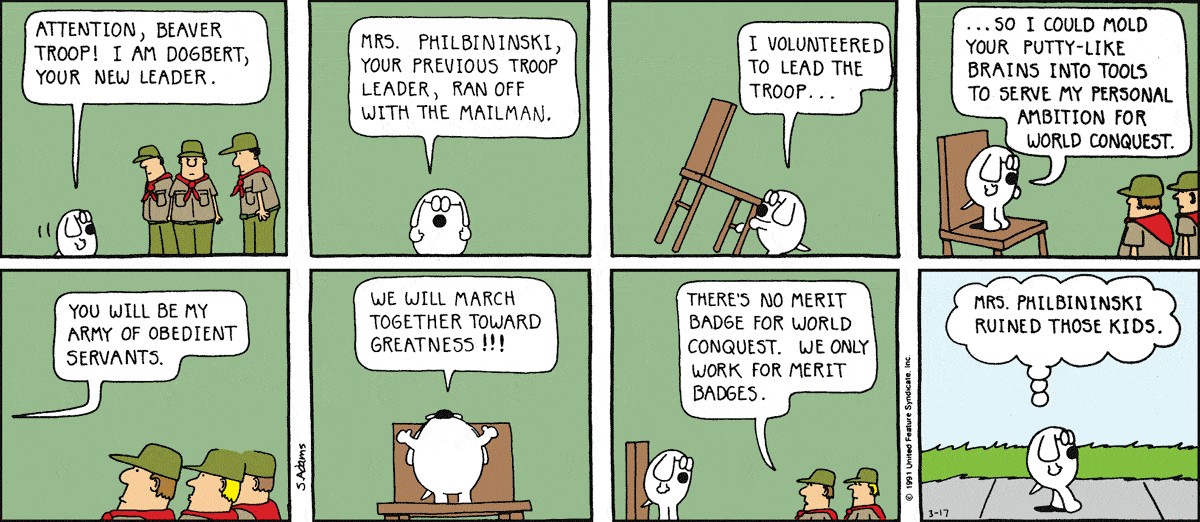Dilbert is one of those comics that has left an indelible mark on readers’ hearts by showing the often puzzling reality of office life with an unwavering sense of humour and biting wit. Scott Adams started the comic strip in 1989, and it depicts the daily blunders of a mild-mannered engineer named Dilbert, whose rational thinking constantly clashes with the illogical world of corporate culture.
Hilarious Comics
The comic’s appeal stems from its candour and ability to depict shared frustrations with bureaucracy, poor management, and workplace follies in a way that is both empathetic and consistently entertaining.
Source & Credit: Scott – Dilbert
Disclaimer: The comics showcased on our platform are the intellectual property of their creators. Our aim is to share these remarkable works with a broader audience. If any artist feels their work is not appropriately credited or is being misused, please contact us promptly for resolution. We respect the rights of creators and are committed to addressing any concerns swiftly.
#1

#2

#3

#4

Dogbert, the talking dog with a taste for domination, adds another layer of satire. Unlike the rest of the characters who are stuck in the corporate grind, Dogbert operates outside of it, often acting as a consultant or self-styled expert offering intentionally bad advice that clueless executives lap up.
#5

#6

#7

#8
He represents a broader critique of the corporate world’s obsession with consultants, jargon, and quick fixes. While Dilbert tries to navigate the system, Dogbert manipulates it with glee, often succeeding by simply understanding how easily people in power can be fooled.

#9

#10

#11

#12

#13

#14

#15

#16

As long as there are offices, bosses, meetings, and the complex dynamics of corporate culture, Dilbert will remain relevant. It captures the eternal struggle of the employee trying to survive and thrive in a world that often seems determined to thwart them at every turn. With its sharp wit, memorable characters, and biting social commentary, Dilbert continues to offer readers both a laugh and a deeper understanding of the strange, sometimes maddening world of work.
Through the lens of these characters, Scott Adam explores the absurdities of corporate culture, lampooning everything from mind-numbing meetings and nonsensical office policies to clueless managers and clueless co-workers. Dilbert’s humor is both relatable and biting, offering readers a cathartic release from the frustrations of the modern workplace while also prompting them to reflect on the absurdities of their own professional lives.
One of the key strengths of Comic Strips lies in its ability to capture the essence of corporate life with remarkable accuracy. Scott draws upon his own experiences working in the corporate world to inform his writing, infusing the strip with a sense of authenticity that resonates with readers. Whether it’s the mindless bureaucracy, the soul-crushing meetings, or the nonsensical jargon, Comic Stripcs lays bare the realities of modern office culture with unflinching precision.
Yet, amidst the humor and satire, Comic Strips also offers astute observations about human nature and the dynamics of power and authority. Through the antics of its characters, the strip explores themes of ambition, greed, incompetence, and the eternal struggle between the individual and the institution. Dilbert himself serves as a reluctant everyman, navigating the treacherous waters of corporate life with a mix of resignation and bemusement, offering readers a window into their own struggles and frustrations.
Over the years, Dilbert Comics has evolved to reflect changes in technology, society, and the workplace. From the rise of the internet and the dot-com bubble to the advent of social media and the gig economy, Scott Adams has adeptly incorporated these developments into the strip, ensuring that Dilbert remains relevant and resonant with readers of all ages.
Over the years, Comic strip has evolved to reflect changes in technology, society, and the workplace. From the rise of the internet and the dot-com bubble to the advent of social media and the gig economy, Scott has adeptly incorporated these developments into the strip, ensuring that Dilbert remains relevant and resonant with readers of all ages.
Despite its success, Dilbert Comic strip has not been without its controversies. Scott , the creator of the strip, has faced criticism for his outspoken views on various social and political issues, including gender, race, and the role of government. His willingness to tackle controversial topics head-on has earned him both praise and condemnation, but it has also sparked important conversations about the role of satire in society and the responsibilities of artists and creators.
In conclusion, Comic strip stands as a testament to the enduring power of satire and humor. Through its sharp wit, insightful commentary, and memorable characters, the strip has entertained and enlightened readers for over three decades, offering a humorous yet poignant reflection on the absurdities of corporate life. As long as there are cubicles, meetings, and clueless bosses, Dilbert Comics will continue to be a beloved staple of the comic strip landscape, providing readers with a much-needed dose of laughter and levity in an often bewildering world.





